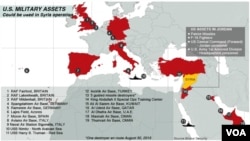Russian President Vladimir Putin is warning of the consequences of a military strike on Syria, as his foreign minister prepares to meet with Secretary of State John Kerry to discuss Moscow's plan to end the threat posed by Syria's chemical weapons.
Putin stressed in a New York Times opinion piece the need to work through the United Nations and not conduct unilateral military action in Syria. He said a U.S military strike "would increase violence and unleash a new wave of terrorism," and could negatively effect efforts to address Iran's nuclear program and the Israeli-Palestinian peace process.
Putin also said there is "every reason" to believe opposition fighters were the ones responsible for using chemical weapons in Syria in a bid to draw an outside military response. The U.S. has blamed the Syrian government for using poison gas against civilians.
Kerry, Lavrov meet in Geneva
Meanwhile, Kerry and his Russian counterpart Sergei Lavrov are due to meet Thursday in Geneva to discuss the details of the Russian-proposed plan for Syria to give up its chemical weapons to the United Nations to be destroyed.
Syrian rebels reject Russian plan
The chief of the rebel Free Syrian Army Salim Idris rejected Russia's proposal in a video posted online, saying the international community should not only remove the weapons, but also punish those responsible for using them.
President Barack Obama this week cautiously endorsed Russia's diplomatic initiative, but said the U.S. military will be ready to respond if diplomacy fails
The U.S. says 1,400 people were killed when Syrian forces used poison gas against civilians last month near Damascus.
President Obama says U.S. ships in the Mediterranean region are staying in place to keep pressure on the Syrian government to live up to any agreement on giving up its chemical weapons. Kerry has said reaching any agreement to remove the chemical-weapons threat in Syria will be "exceedingly difficult."
The Syrian stockpile is one of the world's largest, and is scattered at sites across the country.
Envoys from the five permanent members of the U.N. Security Council -- Britain, China, France, Russia and the United States -- are discussing a possible resolution for securing and dismantling Syria's chemical weapons.
Russia has already said it will block any attempt to include the potential use of military force against Syria to ensure it complies with any order.
Putin stressed in a New York Times opinion piece the need to work through the United Nations and not conduct unilateral military action in Syria. He said a U.S military strike "would increase violence and unleash a new wave of terrorism," and could negatively effect efforts to address Iran's nuclear program and the Israeli-Palestinian peace process.
Putin also said there is "every reason" to believe opposition fighters were the ones responsible for using chemical weapons in Syria in a bid to draw an outside military response. The U.S. has blamed the Syrian government for using poison gas against civilians.
Kerry, Lavrov meet in Geneva
Meanwhile, Kerry and his Russian counterpart Sergei Lavrov are due to meet Thursday in Geneva to discuss the details of the Russian-proposed plan for Syria to give up its chemical weapons to the United Nations to be destroyed.
Officials traveling with Kerry said the talks will test the "reality" of the proposal, and that the U.S. wants Syria to quickly detail its chemical weapons arsenal. They say securing the weapons is possible, but would be "difficult and complicated."
Kerry will also meet Thursday with U.N.-Arab League peace envoy Lakhdar Brahimi.
Syrian rebels reject Russian plan
The chief of the rebel Free Syrian Army Salim Idris rejected Russia's proposal in a video posted online, saying the international community should not only remove the weapons, but also punish those responsible for using them.
President Barack Obama this week cautiously endorsed Russia's diplomatic initiative, but said the U.S. military will be ready to respond if diplomacy fails
The U.S. says 1,400 people were killed when Syrian forces used poison gas against civilians last month near Damascus.
President Obama says U.S. ships in the Mediterranean region are staying in place to keep pressure on the Syrian government to live up to any agreement on giving up its chemical weapons. Kerry has said reaching any agreement to remove the chemical-weapons threat in Syria will be "exceedingly difficult."
The Syrian stockpile is one of the world's largest, and is scattered at sites across the country.
Envoys from the five permanent members of the U.N. Security Council -- Britain, China, France, Russia and the United States -- are discussing a possible resolution for securing and dismantling Syria's chemical weapons.
Russia has already said it will block any attempt to include the potential use of military force against Syria to ensure it complies with any order.






